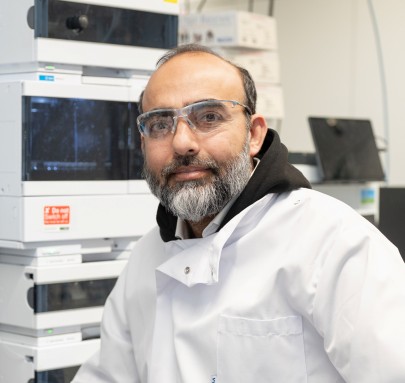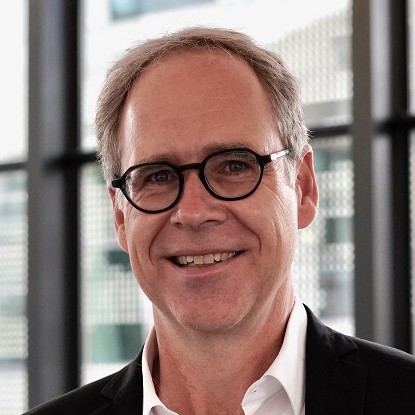Professor Dr Musammir Khan
Age: 42
My research areas: Self-healing Amphiphilic Polymer Co-networks
Name of my University / Research Institute: School of Natural Sciences, National University of Sciences and Technology (NUST), Islamabad
Research period at the TU Darmstadt: May 1 2024 to April 30 2025
Programme: Humboldt Research Fellowship for Experienced Researchers
My field of research is fascinating. The best way to explain it to non-specialists is…
My research work utilizes expertise in materials science (polymer chemistry) to design novel materials for important biomedical and industrial applications. My research is fascinating owing to the convenient processing of low-cost commercially available materials (polymers) using green chemistry approach, thus transforming them into useful starting materials with interesting properties for diverse applications.
What research questions are you currently working on?
Amphiphilic polymer co-networks (APCNs) are materials for biomedical and industrial application such as soft contact lenses, biomedical implants, or surface coating. Currently, I am working on the design of APCNs with research question on their sustainability, self-healing ability, durable mechanical strength and optical transparency.
My most important success in research to date is…
I am working on basic research problems where the main focuses are on the optimization of the reaction parameters for the materials design for promising biomedical and industrial applications. One of my great achievements is the design of new materials from commercially available precursors and then functionalizing them with complementary groups for further industrial applications. The important approach involved in my research is the use of green chemistry i.e. using renewable/biocompatible materials and without the need of external catalyst for final material fabrication.
Will the results of your research have a concrete impact on our everyday lives now or at some later date?
Yes, being a chemist while doing research mostly in applied chemistry, my work aims to have a concrete impact on our everyday lives. However, as my projects are of fundamental science in nature, this will not happen immediately but once the approach becomes mature. In addition, teaching and training of young researchers and students with new skills does have an immediate effect on their everyday life and in long term future career, which is a great achievement.
What innovative developments are you expecting in your field of research in the next few years?
I am working in the polymer chemistry, which is a rapidly growing area with diverse applications ranging from biomedical, environmental and several industrial applications. Currently I am working on amphiphilic polymer co-networks (APCNs) with self-healing ability and mechanical durability. These APCNs combine hydrophilic and hydrophobic components through covalent linkages like thermosets. The APCNs that I develop cannot only heal themselves, but I can also be reprocessed like thermoplastics, thus endowing materials with higher life span.
I became a researcher because…
I became a researcher to utilize my skills for the development of science and society, because I came from an area where there was little concept of higher education or research. To graduate from such background and then continuing advanced research activities has brought much awareness in my hometown. My current research activity has helped and inspired several talented graduate students in my hometown and country to pursue further research and help their communities and society.
I have chosen TU Darmstadt because…
TU-Darmstadt is one of the best places for polymer-based material research with supportive strategies for innovative research idea. In addition, the working host group (Nico Bruns) of TU-Darmstadt was very interesting for me, being focused on green, sustainable and innovative safe materials.
What reputation does German research enjoy in your home country?
German researchers ranked among the best in our home country for being enthusiastic, hardworking and innovative in conducting their research activity. I have already completed one postdoc at Heidelberg University (in Mar 2014 to Sep 2015), but because of this reputation, I was compelled to re-visit again and continue further research in Germany.
What lasting impressions will you take back home with you from your time in Darmstadt and Germany?
The research expertise together with international exposure I got here at TU Darmstadt will have a great impact on my overall performance when going back and resuming my duty in my home institution in Pakistan, for being enthusiastic, hardworking and forward looking for quality (innovative) research. I hope this experience will greatly help and facilitate many research students working under my supervision in the near future.
Questionnaire for the host
Guest of: Professor Dr Nico Bruns
Department: Department of Chemistry
What did you appreciate most about your guest, or what is it that impressed you most favorably…
When Dr Khan approached me to inquire for a research stay in my group, I was immediately intrigued by his excellent research background in the field of polymer-based biomaterials and his interest in amphiphilic polymer conetworks, which have been a long-standing research line in my group. Dr Khan is an excellent researcher and a great colleague to work with, and he brought new ideas and impulses to our research, such as new strategies for covalent-dynamic polymer networks.
You, your team, and TU Darmstadt benefit from your guest’s stay…
We benefit from Mr. Khan’s deep understanding and vast expertise on polymeric materials, which he not only leverages to drive his research project forward, but also shared with our group’s researchers and students. He is an excellent mentor and teacher of research students!







